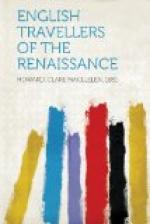“The ordinarie rate of his expence, is this: ten gold crownes a moneth his owne dyet, eight for his man, (at the most) two crownes a moneth his fencing, as much dancing, no lesse his reading, and fiftene crownes monethly his ridings: but this exercise he shall discontinue all the heate of the yeare. The remainder of his 150 pound I allow him for apparell, bookes, Travelling charges, tennis play, and other extraordinaire expences."[330] A few years later Howell fixes annual expense at L300—(L50 extra for every servant.) These three hundred pounds are to pay for riding, dancing, fencing, tennis, clothes, and coach hire—a new item of necessity. An academy would seem to have been a cheaper means of learning accomplishments. For about L110 one might have lodging and diet for himselfe and a man and be taught to ride, fence, ply mathematics, and so forth.[331] Lassels very wisely refrains from telling those not already persuaded, what the cost will be for the magnificent Grand Tour he outlines. We calculate that it would be over L500, for the Earl of Cork paid L1000 a year for his two sons, their governor, only two servants and only saddle-horses:[332] whereas Lassels hints that no one with much pretension to fashion could go through Paris without a coach followed by three lacqueys and a page.[333] Evelyn, at any rate, thought the expenses of a traveller were “vast”: “And believe it Sir, if he reap some contentment extraordinary, from what he hath observed abroad, the pains, sollicitations, watchings, perills, journeys, ill entertainment, absence from friends, and innumerable like inconveniences, joyned to his vast expences, do very dearly, and by a strange kind of extortion, purchase that smal experience and reputation which he can vaunt to have acquired from abroad."[334]




